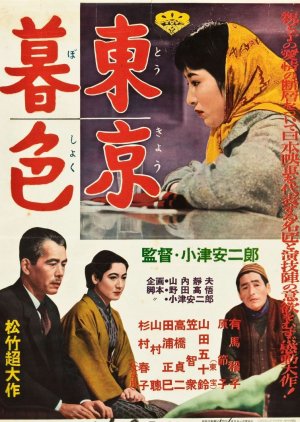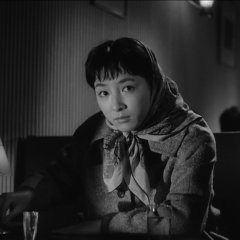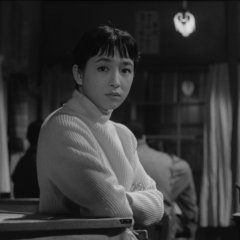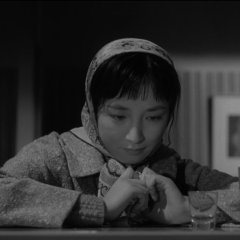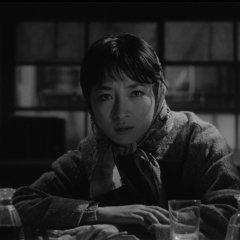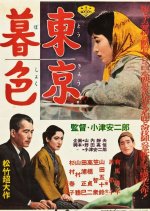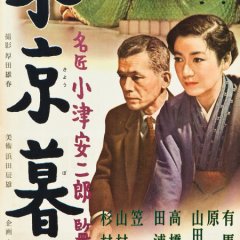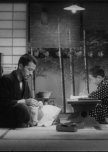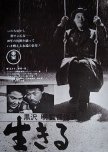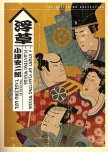Takako volta para a casa de seu pai, Sugiyama, fugindo de seu marido abusivo. Sua irmã Akiko está grávida de uma gravidez indesejada e procura, em vão, pelo namorado. Neste meio tempo, as irmãs descobrem que a mãe que julgavam morta, Kikuko, na verdade tinha abandonado o pai por outro homem. (Fonte: Filmow) Editar Tradução
- Português (Brasil)
- English
- magyar / magyar nyelv
- dansk
- Título original: 東京暮色
- Também conhecido como: Tokyo Twilight , Tokyo Boshoku
- Roteirista e Diretor: Ozu Yasujiro
- Gêneros: Vida, Drama
Onde assistir Crepúsculo em Tóquio
Grátis (sub)
Elenco e Créditos
- Ryu Chishu Papel Principal
- Hara Setsuko Papel Principal
- Arima InekoSugiyama AkikoPapel Principal
- Yamamura SoSeki SekiguchiPapel Secundário
- Sugimura HarukoTakeuchi ShigekoPapel Secundário
- Urabe Kumeko[Komatsu proprietress]Papel Secundário
Resenhas

Esta resenha pode conter spoilers
"I want to start over"
Tokyo Twilight is a film about a disintegrating family and the darkest film I've seen by Director Ozu. The darkest and the most difficult for me to come to grips with. This last of his films in black and white was gorgeous to look at, one of his most aesthetic in regards to framing and composition. But I come back to the subject matter. Do I rate and view it as the audience it was intended for? Or do I rate it as a 21st century woman who was appalled by aspects of the story? I ended up splitting the difference.Takako and her young daughter have moved back in with her father, Sugiyama Shukichi, though he doesn't know she's seeing it as a permanent situation. After pulling the information out of her, she confirms what he's been hearing. That the good Professor Numata she's married to has been drinking heavily. He is also abusive to Takako, but especially her daughter when things have not gone his way at work. Numata's admitted to having no paternal love toward his child.
Akima is the younger sister. She's carrying a secret within her and desperately trying to find her college boyfriend who put it there. With no mother to confide in and not close enough to her sister to share, she bears the burden alone. She stays out late at night and because of this is repeatedly described by men as decadent and wild. Waiting at a café where her boyfriend, Kenji, told he'd meet her she is taken to a police station by a police officer because she shouldn't be out late alone. The place was a known hook up joint for prostitutes, and with Kenji never showing up, it looked like a cruel joke was played on her. Ultimately, she decides to rid herself of her secret since her boyfriend has mostly rid himself of her. Later her aunt tries to play matchmaker, with Akima crying forlornly that she will never marry or have a child.
Shukichi is proper and polite to everyone but also an authoritarian father. He's ready to cut Akima off because he found out she'd been taken to the police station but Takako steps in and soothes his anger. Years earlier Takako would have married someone she'd cared for if Shukichi hadn't insisted she marry Numata instead. His word is the law in their household.
If all this wasn't enough drama, the missing mother shows up in a mahjong parlor Akima and Kenji's friends frequent. No secret stays buried and soon the daughters find out she's back and why she left. Akima fears she has her mother's bad blood and will never be happy or that she was illegitimate. Takako cannot forgive her mother for abandoning them and holds her responsible for Akima's problems. The mother was an enigma, she wanted to reconnect with her daughters but when she found out that her son had died several years earlier, she did so without so much as batting an eye.
Takako and Akima both wish to start over and find happiness. In the end, neither do. Akima suffers a horrible narrative fate to punish her for becoming too modern and breaking familial tradition and traditional female roles. Takako fears her daughter will end up like Akima if she doesn't have both parents raising her and decides to return to her husband. When she informs Shukichi he nods his head and says she'll be successful this time if she tries. Takako looks like a woman heading to the guillotine, painfully aware happiness is not in hers or her daughter's future. After Takako moves out the maid helps Shukichi get ready for work, the birds are singing, the sun is shining and the swelling music tells you this is a happy ending. Maybe for Shukichi it is, but not for his children. Somehow this father remains blithely unaware of his unhappy role in the dissolution of his marriage and the sorrows of his children.
As I mentioned, the framing and shots were among some of my favorite. Ozu's use of light and shadow relegated some scenes to true artwork. Mostly, the score was pleasant enough though the music's bright tone during a tragic time seemed out of place. Ryu, an Ozu regular, did well as the quiet authoritarian father. While this may have been my favorite Hara Setsuko performance thus far, she showed a variety of emotions instead of smiling most of the time, it was distracting knowing that she was only 3 years younger than her "mother" in real life. Arima Ineko was called upon to show a complex array of emotions as she dealt with her family, her irresponsible and selfish boyfriend, and sitting alone making decisions beyond her years and succeeded. The acting though often subdued as it is in Ozu's films felt more thoroughly rounded than usual. All of the characters felt like real people. Ozu's insistence on some characters staring directly into the camera while saying their lines is still a detracting custom for me.
The whole thrust of this story came down to the idea that the family was destroyed because the mother found love while the husband was stationed in Seoul and left upon his return. The daughters didn't have a proper female presence which ended up corrupting Akima. A father's love could not make up for that, even though Takako did not go off the rails. Akima had sexual relations with the boy she loved and was punished in every way for it while he escaped with no repercussions. If the doors of propriety could have been cracked opened for real communication, she might have been able to talk with her father or sister to seek support and help her make the decisions she needed to make. Takada was chained to a man who didn't love her or their child and was abusive. She returned to him because it was the "right" thing to do. And her father simply smiled benignly instead of seeing the fear in his daughter's eyes and supporting her. I know Ozu had a father who was often gone, working in another city, but somehow he missed how a vicious drunk and emotionally vacant father can scar a child forever even more so than an absent one.
This was not a story of reconciliation or redemption, but of punishment and retribution all tied up in a polite, proper bow. Each of the female characters were left in pain and an uncertain future with no chance to start over. The men all went about their happy way. I can usually either follow Ozu's train of thought or make excuses for him, but not this time. Even though his viewpoint was a common one in the 1950's, I was appalled at his treatment of women in the name of tradition and family unity.
2/20/23
Esta resenha foi útil para você?

Quality relationships are the biggest impact on happiness
Tokyo Twilight (1957) was Ozu's last film in black and white. It is a family drama and is regarded as one of Ozu's darkest films. This is a film worth watching if you've already seen a few Ozu films and want to be 'completist' in your Ozu viewing. Otherwise, as a stand alone film selection, I don't recommend it for most folks.Considering the seasonal themes of many Ozu films, Tokyo Twilight features snow, so we are firmly in the season of Winter.
The issue for me, isn't so much the dark themes and plot outcomes, but rather having difficulty accepting Akiko - the distraught daughter who seems to have no luck in life. In some ways, I felt the character's presentation wasn't believable and, as a result, had difficulty empathizing with this character. The two Ozu films that I've seen the actress, Arima Ineko, star in, I was irritated with her characters including Akiko. Ms. Arima's characters present overwhelmingly as stubborn, impatient, and lacking in social skill and regard for others. Perhaps that was intended by Ozu, or perhaps, it was overacted to some extent. In any event, the filmgoer is supposed to feel for Akiko, who has no close relationships to lean on for true support.
Setsuko Hara, on the other hand, plays the depressed older sister role of Takako. She was terrific to watch in this film, and I gained a greater appreciation of her skills after being accustomed to her bubbly, smiling, 'pure' daughter roles in other Ozu films. The subtle sorrow that Ms. Hara projects in Tokyo Twilight is convincing and masterful.
Ozu films can, as an overall style or scheme, be not too explicit about plot. There are ellipses or gaps in the plot. This leaves some of the story plot or character feelings open to interpretation. For many Ozu films, this works well; viewers intuit characters' thoughts and feelings because they're so real and relatable that we don't need image or word to confirm what's going on. However, in Tokyo Twilight, these gaps in plot are more confusing, on average, than other films. It might take some 'studying' after watching the film to come to a full understanding of the plot and themes. I suspect many viewers are not willing to do that, which is why I, again, only recommend this film for the Ozu 'completist'.
Esta resenha foi útil para você?

